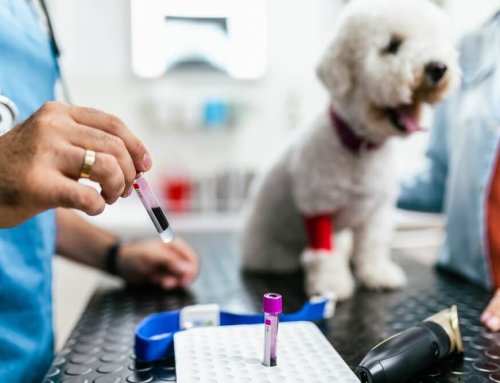No one wants to say goodbye to their beloved pet, but you don’t need a magic spell to add years to your pet’s life. While unexpected situations that shorten your pet’s life can occur, you can take actionable steps to decrease their risk of passing away young. Our 360 Pet Medical team wants to help by providing practical steps for prolonging your pet’s life.
#1: Bring your pet in for regular wellness checkups
All pets should be evaluated by a veterinary professional at least once a year, and every six months once they reach their senior years. Pets instinctually hide illness signs to mask their vulnerability, making recognizing health problems difficult, but regular wellness examinations can detect issues before conditions advance and cause irreversible damage. Diseases detected in the early stages have a better prognosis, and can be more appropriately treated and managed. Diagnostics during a typical wellness checkup can provide a lot of information to our veterinary professionals.
- Physical examination — A thorough physical examination is the first step in a wellness checkup, and evaluating your pet from head to tail can detect conditions such as periodontal disease, heart murmurs or arrhythmias, abdominal masses, and abnormally sized internal organs.
- Weight and body conditioning score (BCS) — We evaluate your pet’s weight and BCS to determine if they are at a healthy weight, and then design a safe weight loss program if they need to lose weight.
- Complete blood count (CBC) — A CBC evaluates your pet’s platelets and white and red blood cells. Abnormalities can indicate issues such as infection and anemia.
- Biochemistry profile — A biochemistry profile evaluates the functional capacity of several organs and systems in your pet’s body. Abnormalities can indicate conditions such as diabetes, liver failure, and kidney disease.
- Urinalysis — A urinalysis evaluates your pet’s urine visually, chemically, and microscopically. Abnormalities can indicate issues such as kidney disease, diabetes, urinary tract infections, and urinary crystals.
#2: Bring in your pet for regular professional veterinary dental cleanings
Stinky breath can indicate a serious health problem in your pet. The bacteria in your pet’s mouth not only cause their breath to smell bad, but can also cause serious damage to the supporting structures of your pet’s teeth, leading to loose and infected teeth. In addition, the bacteria can invade your pet’s bloodstream and cause damage to their internal organs, including their heart, kidneys, and liver. A professional veterinary dental cleaning is necessary to safely and effectively remove the bacteria from your pet’s mouth and under their gum line.
#3: Brush your pet’s teeth daily
Bacteria can begin to accumulate on your pet’s teeth only hours after a professional veterinary cleaning. When your pet eats, they leave behind food particles that attract bacteria, and form plaque on your pet’s teeth. Minerals in your pet’s saliva are deposited in the plaque, causing tartar formation. Daily toothbrushing can help prevent plaque and tartar accumulation. Ensure you use pet-friendly products, because human dental products can be toxic to pets.
#4: Provide year-round parasite prevention to your pet
Many parasites can cause significant health issues for your pet.
- Fleas — Fleas can cause anemia in young puppies and kittens, and can also transmit tapeworms if a pet ingests an infected flea while grooming. In addition, many pets are allergic to the flea’s saliva, and a single flea bite can cause an extreme reaction, with excessive scratching, biting, licking, and chewing.
- Ticks — Ticks transmit diseases, including Lyme disease, Rocky Mountain spotted fever, ehrlichiosis, and babesiosis, that can severely debilitate your pet, and threaten their life in some cases. In addition, pregnant ticks can inject your pet with a neurotoxin that causes a progressive paralysis if the tick is not removed.
- Heartworms — When mosquitoes take a blood meal from your pet, they can transmit heartworms that travel to your pet’s heart and lungs, where they cause significant damage. Cats and dogs are susceptible to heartworms, and pets who solely live indoors are not immune to these parasites.
- Intestinal worms — Hookworms, tapeworms, whipworms, roundworms, giardia, and coccidia can infect your pet’s intestinal tract, causing issues such as malnutrition, weight loss, diarrhea, and vomiting.
#5: Monitor your pet’s weight
Weigh your pet and monitor their BCS on a regular basis to ensure they maintain an ideal weight. Pet obesity is a common problem, and predisposes pets to serious health issues, such as cancer, diabetes, kidney problems, and arthritis.
#6: Feed your pet the proper amount

Ensure you don’t overfeed your pet to help keep them at a healthy weight. Ensure they are receiving the proper amount of food with these steps:
- Determine your pet’s energy requirements — Use a calorie calculator to determine your pet’s daily energy requirements. These tools use your pet’s age, breed, activity level, spay or neuter status, and weight, to calculate their required calories.
- Measure your pet’s meals — Eyeballing your pet’s food portions can result in overfeeding. Use kitchen scales or measuring cups to appropriately measure their meal portions, to ensure you are feeding the correct amount.
- Account for your pet’s treats — Ensure you account for the calories in your pet’s treats when calculating their overall daily energy requirements.
Pets don’t live long enough, but these practical measures can prolong your pet’s life. If you would like to schedule a wellness exam, dental cleaning, or heartworm test for your pet, contact our team at 360 Pet Medical, so we can help add years to your pet’s life.








Leave A Comment